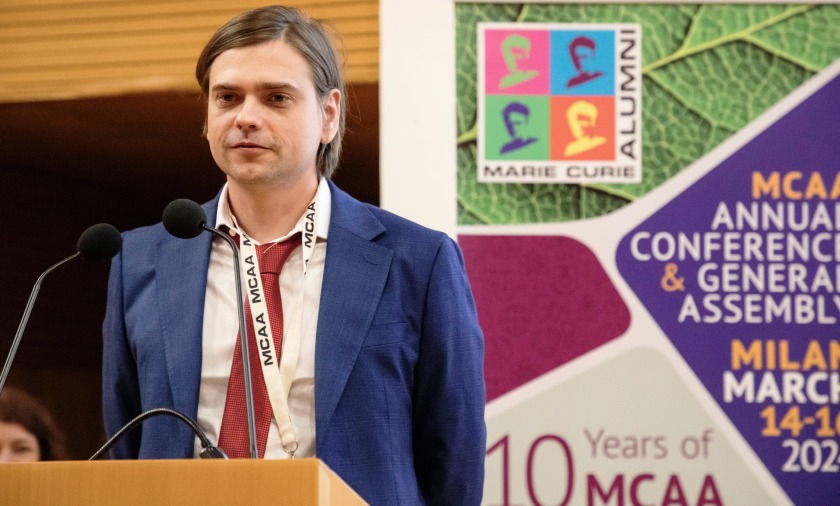Best Innovator Award 2023 for Artem Musiienko

Dr. Artem Musiienko received the MCAA Best Innovator Award for his invention of the CLIMAT-Method of characterising semiconductors at the Marie Curie Alumni Association (MCAA) in Milano, Italy, March 2024.
© MCAA
Dr. Artem Musiienko has been awarded a special prize for his groundbreaking new method for characterising semiconductors. At the recent annual conference of the Marie Curie Alumni Association (MCAA) in Milan, Italy, he received the MCAA Award for the best innovation. Since 2023, Musiienko has been carrying out his research project with a postdoctoral fellowship from the Marie Sklodowska Curie Actions in Antonio Abate's department, Novel Materials and Interfaces for Photovoltaic Solar Cells (SE-AMIP).
Musiienko has developed a new method to comprehensively characterise semiconductors using a single measurement process: The "Constant Light-Induced Magneto-Transport (CLIMAT)" is based on the Hall effect and allows to record 14 different parameters of transport properties of negative and positive charge carriers. The European Patent office has already approved the method's patent (EP23173681), and Artem is currently negotiating with a company to license the technique.
“The CLIMAT method is a disruptive and innovative technique that has the potential to become the gold standard in material characterization”, emphasizes Prof. Antonio Abate. The MCAA Best Innovator Award amounts to 1.500 euros and an award statuette.
arö
https://www.helmholtz-berlin.de/pubbin/news_seite?nid=26446;sprache=en
- Copy link
-
Almost 4,000 People at the Long Night of the Sciences at HZB
Helmholtz-Zentrum Berlin was delighted to welcome nearly 4,000 visitors to its Adlershof campus for the Long Night of the Sciences. It was a fantastic celebration of science, and we thank all our guests for their great interest.
-
New Helmholtz Young Investigator Group at HZB on perovskite solar cells
Silvia Mariotti starts building up the new Helmholtz Young Investigator Group ‘Perovskite-based multi-junction solar cells’. The perovskite expert, who was previously based at Okinawa University in Japan, aims to advance the development of multi-junction solar cells made from different perovskite layers.
-
Hydrogen storage in MXene: It all depends on diffusion processes
Two-dimensional (2D) materials such as MXene are of great interest for hydrogen storage. An expert from HZB has investigated the diffusion of hydrogen in MXene using density functional theory. This modelling provides valuable insights into the key diffusion mechanisms and hydrogen's interaction with Ti₃C₂ MXene, offering a solid foundation for further experimental research.
